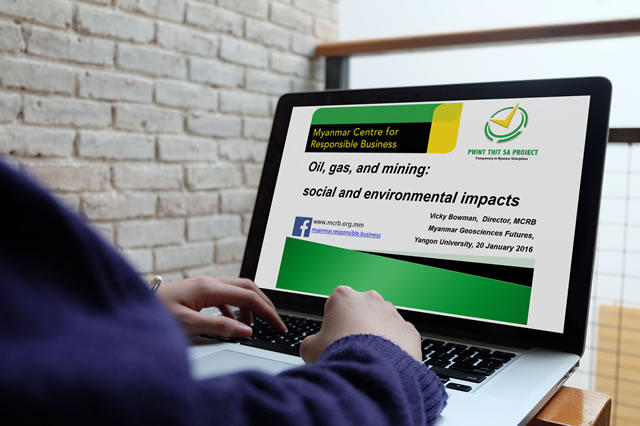Tertiary Education Sector is Essential for Effective Environmental Impact Assessment in Myanmar

Vicky Bowman was invited to speak to a conference on Myanmar Geosciences Futures hosted at Yangon University with the support of the British Council and the UK Government’s Foreign and Commonwealth Office, on 20 January.
The purpose of the workshop was to share knowledge, identify areas of common research interests, build relationships and identify training, curriculum and teaching needs and explore collaboration opportunities in the Earth Sciences with universities in Myanmar.
Participants included key faculty members from universities in Myanmar that are associated with Geoscience subjects, some national and international representatives from the Oil and Gas sector, retired Myanmar professors and resource persons and some high level officials from Ministry of Mines and Ministry of Irrigation. Diiscussions covered course content, curriculum and teaching methods, and research capacity and interests of universities in both countries, to assist in the identification of needs related to the research and teaching of Geoscience subjects at Myanmar universities and on developing linkage with industries. The workshop also looked at multidisciplinary areas affecting Geosciences, such as law and climate change.
Vicky’s presentation briefly outlined the work of the Centre, highlighting the Sector-Wide Impact Assessment on Oil and Gas which was published in September 2014, and the ongoing research for a similar assessment of the Mining Sector in Myanmar. She briefed participants on the requirements for Environmental Impact Assessment and Initial Environmental Examination in the oil, gas and mining sector, which had been recently adopted in the new Myanmar EIA Procedures (Notification 616/2015 – see official Burmese and unofficial English translation), and the potential these Procedures had to promote more responsible investment with fewer negative and more positive impacts. She highlighted the exploding need for Myanmar experts to conduct baseline studies and study potential social and environmental impacts, and the opportunities this provided for Myanmar’s universities to tailor their curricula to these emerging needs and support business-academic exchange.
One particular area of follow-up discussion raised by the geologists was the unique phenomenon of artisanal oil mining (twin-zar-yo) in Myanmar (see Box 11 of the Oil and Gas SWIA), and the challenges for large companies of addressing its impacts in a way which improved safety and environmental protection while not negatively impacting on livelihoods, a challenge also found with artisanal mining both in Myanmar and elsewhere. These issues deserve further academic research.
Read also
- Building Environmental Legal Advocacy Skills for Civil Society Leaders
- Investors Need to Identify their Impacts on Myanmar’s Biodiversity and Ecosystems Early On, to Avoid Cost and Conflict Later
- Building Understanding of EIA and Responsible Business for Civil Society Groups in Southern and Eastern Shan State
- Working with Community Groups in Shan State on Responsible Business and EIA
- Join MCRB and Thant Myanmar in the Battle to Beat Plastic Pollution
 English
English မြန်မာ
မြန်မာ မြန်မာ (unicode)
မြန်မာ (unicode)










